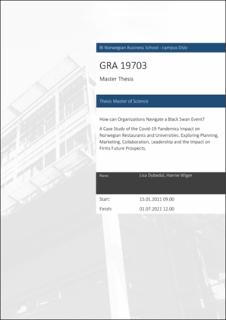| dc.description.abstract | Black Swans are unpredictable events and there is no way to predict what kind of impact they will have. However, we know they will have a greater impact on the affected community than a “normal” crisis. It is uncertain when the next Black Swan event will occur, but we know it will. As these events occur, organizations are forced to adapt their operations to the new environment. Thus, it is important to have the right resources to optimize their outcome. There is little prior research on this topic, especially regarding marketing. Through exploring how companies have navigated the Covid-19 pandemic, examining planning, changing marketing activities, leadership, collaboration and the pandemics impact on firm’s future prospects, this thesis contributes towards closing this gap.
A case study approach using a multi-case design was selected for the research. Thirteen in depth-interviews with respondents from eleven different companies were conducted. The findings show that when dealing with a Black Swan event, it is of high importance that the organization is agile in all aspects of their operations. The marketing department is key in a situation like this, as they impact all departments of the organization. Being able to adapt marketing activities to fit the new business environment is crucial in order to maintain the market position. Clear internal and external communication is an important part of crisis management, as this decreases the level of uncertainty for both employees and customers. The findings also show that having a specific plan in place does not necessarily result in any benefits, compared to firms without a plan. As the situation after a Black Swan is so uncertain, plans are likely to be changed.
However, if the emergency plans are easily flexible, they can improve response time. It is also evident that sharing information and collaborating with competing firms is very beneficial in a situation like this. By sharing information and collaborating one can reduce costs, speed up processes and improve safety measures for all parties involved.
This study provides managers with useful insight into how they can prepare their organization for the next Black Swan, through examples of how firms from two different industries have handled the Covid-19 pandemic. Altogether, the results shed light on key factors to consider when navigating a Black Swan event. | en_US |
